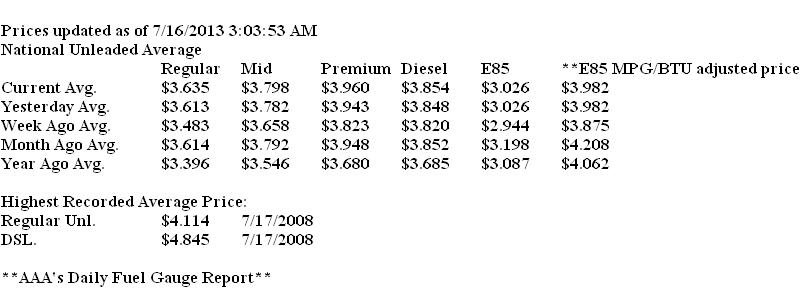
WASHINGTON CITY— Drivers who are stopped and cited by police officers for a moving violation in Washington unwittingly assist in covering the increased cost of fuel for the vehicles that law enforcement officers use to service the community. A “fuel surcharge fee” is included in the amount required to satisfy the citation, a surcharge other local cities do not impose.
Departments across the United States were forced to reassess their operations to avoid budget shortfalls in response to the downturn in the economy years ago and, according to Police Chief Magazine, with the increases in fuel costs in 2008, law enforcement agencies were no exception. Among many others, Washington City implemented the fuel surcharge.
Similar to adding a “sin” tax to cigarettes or other things considered undesirable or harmful, this fee passes the cost of operations into the hands of those who are purportedly causing the problem — traffic violators.
The fuel surcharge
The fuel surcharge was created in Washington City September 2008, set at $18.50 per moving violation citation. It remains and is the same today.
Increasing the cost of government operations via fees and property tax revenues that expand the spendable budget is seldom popular. The fuel surcharge was proposed to directly defray fuel expenses in lieu of raising taxes on the general public.
Fuel and oil costs for Washington City in 2008 were $72,000 which was 13.19 percent of the total police budget at the time, Washington City Police Chief Jim Keith said.
Currently fuel and oil takes up 20 to 25 percent of the police department’s budget, Keith said, and the police force does not generate revenue — it manages it.
The tentative 2014 budget shows that fuel and oil costs for the police department currently take up just over $69,000 a year.
“The fuel surcharge fee is assessed by the court at the request of the city,” the Police Department’s public information officer, Ed Kantor, said. “It is added to all citations that involve moving violations where the individual cited has either been found guilty by the court or forfeited bail.”
This includes citations issued during the course of the investigation of traffic collisions.
The fuel surcharge is applied only to the fuel costs incurred by city-owned vehicles assigned to the police department and is not generating revenue for the city, Kantor said.
Reasoning
“The fuel surcharge was passed by the council to more fairly cost-out fuel charges from the general taxpayers of the community to those who create the infractions associated with traffic citations,” Washington City Manager Roger Carter said.
Citizens Respond
“It’s ridiculous to charge traffic violators exclusively,” Steve Robinson, a student, said, “especially when police vehicles are used for a hundred other things throughout the day. Why not just raise the price of all tickets? Or those who cost more in resources and manpower than traffic violators?”
The fuel surcharge is simply a flat rate, Keith said.
“Don’t they budget for fuel costs already?” Bill Torres, retired veteran asked. “It seems like the department is generating revenue.”
Service delivery options
Many companies and agencies have implemented a fuel surcharge – from FedEx to UPS to airports to your local “fix it” man, the idea of passing fuel costs on to the consumer is nothing new; however, unlike most government agencies or businesses, police departments operate 24 hours a day, 365 days a year on behalf of and for the benefit of the public as a whole.
Director of Public Safety in Cordele, Ga., and writer for Police Chief Magazine, W. Dwayne Orrick, wrote:
Police Departments are the only organization where one may call a central phone number and within a few minutes $50,000 to $100,000 worth of trained staff and equipment will arrive at the caller’s front door to resolve the problem.
Consumption reduction
There are a number of options police departments across the U.S. have come up with to continue to reduce fuel consumption costs. Some examples that officers can incorporate into everyday behavior are to turn the vehicle off when it is stopped, deploy two-officer units which reduces fuel consumption by up to 50 percent.
Many units have implemented officers on bikes. Parking vehicles for a certain amount of time per shift is also an option. Some departments across the U.S. have limited the take-home privileges so vehicles are not used for personal business. Many officers in large cities that use laptops and mobile data may also work from home instead of driving into the station.
Possible consequences to fuel reduction
Not every solution to fuel consumption fits every region. For example, with temperatures reaching 109 degrees and beyond in the summertime in Southern Utah, turning a vehicle off may be impractical and unsafe compared to cooler parts of the U.S. And deploying two-officer units may limit response time and area coverage which in turn could cause operational costs to exceed the savings in fuel costs – not to mention result in other negative impacts.
Fuel Prices
The national average cost of 1 gallon of gas July 16, 2013, is shown in the following chart:
How other Utah agencies respond to increasing fuel prices
While some agencies and companies within Utah added a fuel charge to their services in 2008, some have actually dropped them. In 2010, the Utah Transit Authority removed their fuel charge because diesel fuel prices dropped below $3 per gallon.
UTA’s policy is to only implement a surcharge when the average retail diesel fuel price rises above $3 per gallon as reported by the U.S. Department of Energy.
When asked about whether St. George Police Department has ever implemented a fuel surcharge like other government agencies or businesses, Officer Derek Lewis, St. George Police Department, said no.
“Entities such as UTA use funding from charging riders who use their services,” Lewis said. “When the fuel costs were on the rise, they added a fee to the riders to help cover the rise in fuel costs.”
Officer Lewis expanded in an email:
With the police department, we do not charge people for using our services. Since we do not charge fees for using the police department services, I do not know how we could implement a fuel surcharge. All of our fuel costs have to be budgeted, and if we go over we have to pull money from another budgeted item.
St. George Police Department has other methods to reduce fuel consumption to meet their budgetary requirements for fuel and oil. Lewis continues in the email:
Our method of dealing with the rise in fuel costs were to cut back on un-needed driving, make sure cars are not running when parked, etc. We also started tracking our vehicles mileage monthly to ensure none of our cars are being driven excessively.
“We don’t have surcharges,” Jim Tracy, Sheriff of Utah County, said over the phone. “Our commission has an internal service fund which we receive money from for oil, gas and car maintenance.”
“There are no hidden costs within our budget,” Tracy said.
As UTA costs fluctuate their ticket prices are adapted to compensate for fuel surcharges. Washington County Police Department uses a simple flat rate, which does not provide for any associated fluctuation with actual fuel costs.
Will the fuel surcharge be removed?
There are no current plans to increase the fee amount, Kantor said. If fuel costs go down the fee could be reduced or removed.
One may ask why the fuel surcharge is still in place as actual fuel prices rise and fall.
“It is still a more equitable way to appropriate costs from the general taxpayer to those who require the service,” Kantor said.
Keith said he doesn’t see prices dropping to the point that the fuel surcharge will be removed. He does not have a number that the average cost of 1 gallon of gas must drop to in order for it to be considered for removal.
How the surcharge benefits Washington City
“It provides equity in cost allocation by those who require the service,” Carter said. “Violators pay for a more accurate cost of enforcement.”
Essentially, the Department’s position is that the money is necessary to the city and the violators are paying the price, the alternative being to raise taxes on the general population.
“The fuel surcharge fee allows the city to avoid a tax or other financial impact on those drivers in our community who do not violate traffic laws,” Kantor said, “and therefore, do not require this service.”
Drawbacks
Violators pay slightly more for the enforcement associated with their infraction.
A simple math equation taking the fuel surcharge amount times the average number of tickets written in a year may challenge the Department’s position that it directly offsets the costs associated with traffic enforcement. If the amount of money generated by the surcharge is greater than an aggregate cost associated exclusively with traffic violations – if that cost can be extracted from the overall use of the police fleet in its public service – then isn’t it a “sin tax” of a sort as some suggest by virtue of it imposing the city’s fleet fuel and costs largely on a specified few, the traffic violator?
The city’s stance
The staff and council have always supported equity or “pay-for-service” by those who use the services, Carter said. So, how would one calculate the cost to a police force that is associated exclusively with addressing traffic violators?
The City’s Promise
“The city is mindful of making sure that, where possible, those who use services pay for those services,” Carter said, “we try to keep the general tax costs to the public as minimal as possible.”
“General taxpayers do not pay for costs they do not create,” Carter said.
Related Posts
- Washington City police subject to monthly point system; quota?
- Perspectives: Keeping peace, keeping tabs, burdening officers
- ON Kilter: The litmus test for laws and government
Email: [email protected]
Twitter: @sarahisaacson1
Copyright St. George News, SaintGeorgeUtah.com LLC, 2013, all rights reserved.


There is a very simple way to avoid paying this fee. Obey the traffic laws. There now, that isn’t really so difficult to figure out, is it?
I can’t believe people are … about this. You got a ticket for a reason: YOU BROKE THE LAW. Now pay it and the measly “fee,” learn how to be a better driver, and let the police do their real job of protecting the community rather than wasting time pulling you over because you were speeding in your mad rush to get your next Mountain Dew.
YOU DO THE CRIME, YOU PAY THE FINE. Period.
Ed. ellipsis
I guess cops NEVER pull people over unless they have broken the law. Except if you are black. Or brown. Or tan. Or young. Or have facial hair. Or after midnight. Yep cops NEVER pull people over for FALSE reasons. They are always honest and never charge an innocent person of anything. Congrats if you live in that world.
It’s not a matter of getting upset about this fee. This article is informing the public about a change in operating procedure in the Washington police department. What citizens of Washington should be thinking about is whether this is how they want their city to do business. Is it proper for each department to start tacking on fees for this, that or the other? Mention is made in the article of how the St. George PD handles fuel expenses (” All of our fuel costs have to be budgeted, and if we go over we have to pull money from another budgeted item.”). I would imagine this USED to be the same for Washington City PD. Is the change to a fee-for-service agency for the best? I don’t know, but I’d be interested in hearing a discussion between those who support it and those opposed.
Yea this comment coming from a very unethical attorney…:-)